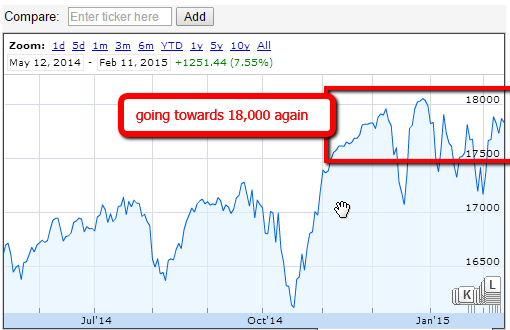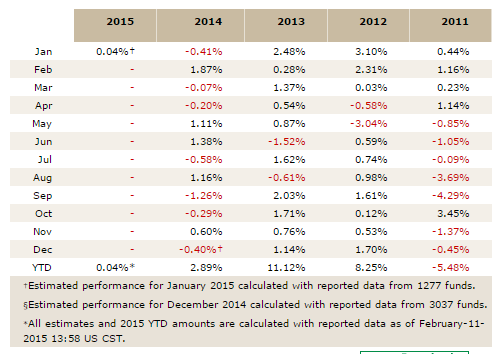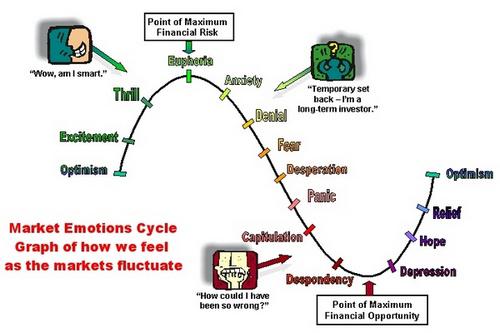Scalper1 News


 Summary The Dow is clawing back to its all-time high, and how it affects investors. Hedge fund performances suck, but are you getting suckered in to the hype? There is a need to reassess your attitude towards risk during market cycles. The Dow is just below its all-time high again. After all these years of a bull run, Mr. Market is still giddy with excitement and wants you to join the ride. But while Mr. Market puts on his charm during this upward market, I am reminded of Howard Marks’ memo titled “Ditto” which goes over market psychology and investor sentiment. But First… You are Missing Out Feel like everyone else is making money except you? Are you missing out on this market upside? Well, that’s a lie because in 2014, hedge funds performed miserably. The average hedge fund performance was under 3%. 2012 and 2011 weren’t impressive either. If at any point during the past few months or years you thought to yourself “I’m missing out”, then you are not alone. However, you shouldn’t be worried or concerned. If the best investors can’t get anywhere near the indexes, then you have no chance of doing any better, right? Wrong. You and I know that investing should be emotionless, but one of the easiest ways to get emotional is when you feel like you need to act to keep up, or when you start comparing yourself to other investors. The difficult part is ignoring the itch that makes you want to get trigger happy. In fact, we should be focusing on limiting our risk by understanding how market cycles affect us. Over the years, I’ve become convinced that fluctuation in investor attitudes toward risk contributes more to major market movements than anything else. I don’t expect this to ever change. – Howard Marks It’s bull markets like these where it just seems like everything is going up where many people crumble and get suckered in to buying stocks that they otherwise would not buy. Simply because they do not want to get left behind. Herd mentality isn’t just about buying whatever the next person is buying. Herd mentality exists primarily because of human behavior and getting caught up in emotions. So are you really missing out? Not at all. That’s what your emotions are telling you. Not what your logic is telling you. The Cycle in Attitudes towards Risk I’m sure you have seen the image below. And to complement this, here is Howard Marks’ version. 1. When economic growth is slow or negative and markets are weak, most people worry about losing money and disregard the risk of missing opportunities. Only a few stout-hearted contrarians are capable of imagining that improvement is possible. 2. Then the economy shows some signs of life, and corporate earnings begin to move up rather than down. 3. Sooner or later, economic growth takes hold visibly and earnings show surprising gains. 4. This excess of reality over expectations causes security prices to start moving up. 5. Because of those gains – along with the improving economic and corporate news – the average investor realizes that improvement is actually underway. Confidence rises. Investors feel richer and smarter, forget their prior bad experience, and extrapolate the recent progress. 6. Skepticism and caution abate; optimism and aggressiveness take their place. 7. Anyone who’s been sitting out the dance experiences the pain of watching from the sidelines as assets appreciate. The bystanders feel regret and are gradually suckered in. 8. The longer this process goes on, the more enthusiasm for investments rises and resistance subsides. People worry less about losing money and more about missing opportunities. 9. Risk aversion evaporates and investors behave more aggressively. People begin to have difficulty imagining how losses could ever occur. And so goes the path towards a mania or bubble. How to Keep Your Emotions In Check One of the easiest methods of controlling your emotions is to know the value of your companies. I just love how Prof. Damodaran puts it in this previous article I wrote because it’s exactly how I process it. Valuation slows the process down, gives your rational side a chance to mount an argument. Most investors don’t want to hear about valuation because it challenges their desire to hear what they want about their holdings. But valuation is the compass that keeps you on the right path. My valuations are not always correct, but it’s saved my bacon on so many occasions. It’s not just about finding undervalued stocks to buy, it also helps with selling stocks that have become expensive. You don’t know if it’s expensive unless you know what something is worth. That way, you can protect yourself from unnecessary losses. I love valuation and it’s the reason why I’m always using my stock analysis tool and checking my rationale with cold hard facts. Unless I find a legitimate reason for why I have to increase my valuation from $50 to $300 without solid evidence, it’s easy to recognize I’m fooling myself. This is NOT a Market Prediction Even with the Dow just over 18,000, I have no opinion on whether the market is undervalued or overvalued. It’s easier for individual companies, but more difficult for an index. All I know is that there are always pockets of opportunity available. The main idea I want to share is to not fall victim to feeling like you are missing out. Keep your risk assessment in check and let the market do what the market does. Invest independent of the market. In this interview with Mohnish Pabrai , Pabrai talks about how his fund was down 65% from the peak at one point, but his wife had no clue because his behavior pattern did not change. Even in a really bad year, he was sticking with his principles. You do not want to be in a place where you go from worrying about missing opportunities to worrying about losing money. Disclosure: The author has no positions in any stocks mentioned, and no plans to initiate any positions within the next 72 hours. (More…) The author wrote this article themselves, and it expresses their own opinions. The author is not receiving compensation for it. The author has no business relationship with any company whose stock is mentioned in this article. Scalper1 News
Summary The Dow is clawing back to its all-time high, and how it affects investors. Hedge fund performances suck, but are you getting suckered in to the hype? There is a need to reassess your attitude towards risk during market cycles. The Dow is just below its all-time high again. After all these years of a bull run, Mr. Market is still giddy with excitement and wants you to join the ride. But while Mr. Market puts on his charm during this upward market, I am reminded of Howard Marks’ memo titled “Ditto” which goes over market psychology and investor sentiment. But First… You are Missing Out Feel like everyone else is making money except you? Are you missing out on this market upside? Well, that’s a lie because in 2014, hedge funds performed miserably. The average hedge fund performance was under 3%. 2012 and 2011 weren’t impressive either. If at any point during the past few months or years you thought to yourself “I’m missing out”, then you are not alone. However, you shouldn’t be worried or concerned. If the best investors can’t get anywhere near the indexes, then you have no chance of doing any better, right? Wrong. You and I know that investing should be emotionless, but one of the easiest ways to get emotional is when you feel like you need to act to keep up, or when you start comparing yourself to other investors. The difficult part is ignoring the itch that makes you want to get trigger happy. In fact, we should be focusing on limiting our risk by understanding how market cycles affect us. Over the years, I’ve become convinced that fluctuation in investor attitudes toward risk contributes more to major market movements than anything else. I don’t expect this to ever change. – Howard Marks It’s bull markets like these where it just seems like everything is going up where many people crumble and get suckered in to buying stocks that they otherwise would not buy. Simply because they do not want to get left behind. Herd mentality isn’t just about buying whatever the next person is buying. Herd mentality exists primarily because of human behavior and getting caught up in emotions. So are you really missing out? Not at all. That’s what your emotions are telling you. Not what your logic is telling you. The Cycle in Attitudes towards Risk I’m sure you have seen the image below. And to complement this, here is Howard Marks’ version. 1. When economic growth is slow or negative and markets are weak, most people worry about losing money and disregard the risk of missing opportunities. Only a few stout-hearted contrarians are capable of imagining that improvement is possible. 2. Then the economy shows some signs of life, and corporate earnings begin to move up rather than down. 3. Sooner or later, economic growth takes hold visibly and earnings show surprising gains. 4. This excess of reality over expectations causes security prices to start moving up. 5. Because of those gains – along with the improving economic and corporate news – the average investor realizes that improvement is actually underway. Confidence rises. Investors feel richer and smarter, forget their prior bad experience, and extrapolate the recent progress. 6. Skepticism and caution abate; optimism and aggressiveness take their place. 7. Anyone who’s been sitting out the dance experiences the pain of watching from the sidelines as assets appreciate. The bystanders feel regret and are gradually suckered in. 8. The longer this process goes on, the more enthusiasm for investments rises and resistance subsides. People worry less about losing money and more about missing opportunities. 9. Risk aversion evaporates and investors behave more aggressively. People begin to have difficulty imagining how losses could ever occur. And so goes the path towards a mania or bubble. How to Keep Your Emotions In Check One of the easiest methods of controlling your emotions is to know the value of your companies. I just love how Prof. Damodaran puts it in this previous article I wrote because it’s exactly how I process it. Valuation slows the process down, gives your rational side a chance to mount an argument. Most investors don’t want to hear about valuation because it challenges their desire to hear what they want about their holdings. But valuation is the compass that keeps you on the right path. My valuations are not always correct, but it’s saved my bacon on so many occasions. It’s not just about finding undervalued stocks to buy, it also helps with selling stocks that have become expensive. You don’t know if it’s expensive unless you know what something is worth. That way, you can protect yourself from unnecessary losses. I love valuation and it’s the reason why I’m always using my stock analysis tool and checking my rationale with cold hard facts. Unless I find a legitimate reason for why I have to increase my valuation from $50 to $300 without solid evidence, it’s easy to recognize I’m fooling myself. This is NOT a Market Prediction Even with the Dow just over 18,000, I have no opinion on whether the market is undervalued or overvalued. It’s easier for individual companies, but more difficult for an index. All I know is that there are always pockets of opportunity available. The main idea I want to share is to not fall victim to feeling like you are missing out. Keep your risk assessment in check and let the market do what the market does. Invest independent of the market. In this interview with Mohnish Pabrai , Pabrai talks about how his fund was down 65% from the peak at one point, but his wife had no clue because his behavior pattern did not change. Even in a really bad year, he was sticking with his principles. You do not want to be in a place where you go from worrying about missing opportunities to worrying about losing money. Disclosure: The author has no positions in any stocks mentioned, and no plans to initiate any positions within the next 72 hours. (More…) The author wrote this article themselves, and it expresses their own opinions. The author is not receiving compensation for it. The author has no business relationship with any company whose stock is mentioned in this article. Scalper1 News
Scalper1 News